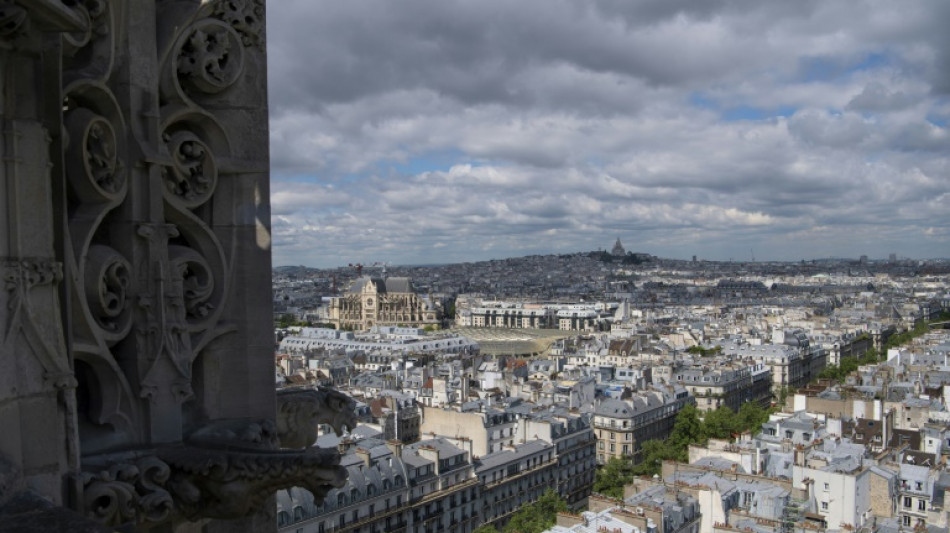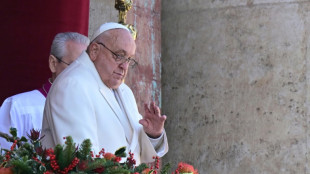
-
 'We couldn't find their bodies': Indonesian tsunami survivors mourn the dead
'We couldn't find their bodies': Indonesian tsunami survivors mourn the dead
-
Azerbaijan mourns 38 killed in plane crash in Kazakhstan

-
 Konstas and Khawaja put Australia on top in 4th Test against India
Konstas and Khawaja put Australia on top in 4th Test against India
-
Lakers pip Warriors after another LeBron-Curry classic

-
 India readies for 400 million pilgrims at mammoth festival
India readies for 400 million pilgrims at mammoth festival
-
Nepal hosts hot air balloon festival

-
 Asia stocks up as 'Santa Rally' persists
Asia stocks up as 'Santa Rally' persists
-
Tears, prayers as Asia mourns tsunami dead 20 years on

-
 Sydney-Hobart yacht crews set off on gale-threatened race
Sydney-Hobart yacht crews set off on gale-threatened race
-
Key public service makes quiet return in Gaza

-
 Fearless Konstas slams 60 as Australia take upper hand against India
Fearless Konstas slams 60 as Australia take upper hand against India
-
Bridges outduels Wembanyama, Celtics lose again

-
 Hungry Sabalenka ready for more Slam success
Hungry Sabalenka ready for more Slam success
-
Mass jailbreak in Mozambique amid post-election unrest

-
 Azerbaijani jet crashes in Kazakhstan, killing 38
Azerbaijani jet crashes in Kazakhstan, killing 38
-
Bridges outduels Wembanyama as Knicks beat Spurs

-
 2004 Indian Ocean tsunami: what to know 20 years on
2004 Indian Ocean tsunami: what to know 20 years on
-
Asia to mourn tsunami dead with ceremonies 20 years on

-
 Syrians protest after video of attack on Alawite shrine
Syrians protest after video of attack on Alawite shrine
-
Russian state owner says cargo ship blast was 'terrorist attack'

-
 38 dead as Azerbaijani jet crashes in Kazakhstan
38 dead as Azerbaijani jet crashes in Kazakhstan
-
Crisis-hit Valencia hire West Brom's Corberan as new boss

-
 Suriname ex-dictator and fugitive Desi Bouterse dead at 79
Suriname ex-dictator and fugitive Desi Bouterse dead at 79
-
35 feared dead as Azerbaijani jet crashes in Kazakhstan

-
 Pope calls for 'arms to be silenced' in Christmas appeal
Pope calls for 'arms to be silenced' in Christmas appeal
-
Syria authorities say torched 1 million captagon pills

-
 Pope calls for 'arms to be silenced' across world
Pope calls for 'arms to be silenced' across world
-
32 survivors as Azerbaijani jet crashes in Kazakhstan

-
 Pakistan air strikes kill 46 in Afghanistan, Kabul says
Pakistan air strikes kill 46 in Afghanistan, Kabul says
-
Liverpool host Foxes, Arsenal prepare for life without Saka

-
 Japan FM raises 'serious concerns' over China military buildup
Japan FM raises 'serious concerns' over China military buildup
-
Pope's sombre message in Christmas under shadow of war

-
 Zelensky condemns Russian 'inhumane' Christmas attack on energy grid
Zelensky condemns Russian 'inhumane' Christmas attack on energy grid
-
Sweeping Vietnam internet law comes into force

-
 Pope kicks off Christmas under shadow of war
Pope kicks off Christmas under shadow of war
-
Catholics hold muted Christmas mass in Indonesia's Sharia stronghold

-
 Japan's top diplomat in China to address 'challenges'
Japan's top diplomat in China to address 'challenges'
-
Thousands attend Christmas charity dinner in Buenos Aires

-
 Demand for Japanese content booms post 'Shogun'
Demand for Japanese content booms post 'Shogun'
-
As India's Bollywood shifts, stars and snappers click

-
 Mystery drones won't interfere with Santa's work: US tracker
Mystery drones won't interfere with Santa's work: US tracker
-
Djokovic eyes more Slam glory as Swiatek returns under doping cloud

-
 Australia's in-form Head confirmed fit for Boxing Day Test
Australia's in-form Head confirmed fit for Boxing Day Test
-
Brazilian midfielder Oscar returns to Sao Paulo

-
 'Wemby' and 'Ant-Man' to make NBA Christmas debuts
'Wemby' and 'Ant-Man' to make NBA Christmas debuts
-
US agency focused on foreign disinformation shuts down

-
 On Christmas Eve, Pope Francis launches holy Jubilee year
On Christmas Eve, Pope Francis launches holy Jubilee year
-
'Like a dream': AFP photographer's return to Syria

-
 Chiefs seek top seed in holiday test for playoff-bound NFL teams
Chiefs seek top seed in holiday test for playoff-bound NFL teams
-
Panamanians protest 'public enemy' Trump's canal threat


Where in the world is closest to becoming a '15-minute city'?
Paris and Milan are among the cities closest to reaching the urban planning goal of being a "15-minute city," while car-dependent metropolises in the United States and elsewhere lag behind, a worldwide analysis said Monday.
In fact, the central areas of many cities already meet the definition of a 15 minute-city, which means that residents are within a quarter-hour walk or bike ride from everything they need to a lead a good life, the analysis found.
But even within a city, there are often stark differences between the wealthy inner cities and the urban sprawl on their outskirts, according to the Italian researchers behind the new study.
The concept of the 15-minute city gained traction during the Covid pandemic, when lockdowns put more focus on local neighbourhoods.
It has since been embraced by dozens of mayors around the world -- and become the target of conspiracy theorists online.
For the new study, published in the journal Nature Cities, the researchers built an online database looking at roughly 10,000 cities globally.
They used open source data to map out how far of a walk or cycle residents were from different services, including shops, restaurants, education, exercise and healthcare.
"A lot of people already live in a 15-minute city," study co-author Hygor Piaget Monteiro Melo told AFP.
But it depends on where you look within a city, he said, because of the inequality in access to services between the centre and periphery.
- No 'utopia' -
What is clear, the researchers noted, is that population density is a crucial factor -- if enough people are living close enough to each other, it is much easier for them to have easy access to services.
This meant that somewhat smaller yet relatively dense cities such as Italy's Milan or Spain's Barcelona scored well on their map, which was made available online.
When it came to the biggest cities, "Paris is an outlier," lead study author Matteo Bruno told AFP.
The mayor of Paris embraced the concept in 2020, and a "considerable fraction" of the city is below the 15-minute mark, the study said.
Some European cities have a head start because they were built centuries ago at a time before cars -- when basically all towns had to be 15-minute cities, the researchers said.
Cities built more recently with cars specifically in mind -- particularly in the United States -- fared far less well on the map.
Atlanta in particular stood out as being a long way from being a 15-minute city. Future Olympic host Los Angeles also lagged behind most others for walkability, as did several Chinese cities including Chongqing.
But when it comes to cities, there are always trade-offs -- and there is no single right answer, the researchers said.
"The 15-minute city is often presented as a utopia -- it's not," Bruno said.
Americans in sprawled-out cities usually have their own houses and backyards, while Europeans in densely populated cities tend to live in apartments, illustrating the important role played by culture, Bruno said.
And central parts of US cities such as New York, San Francisco and Milwaukee were under the 15-minute threshold.
"Manhattan is definitely one of the most 15-minute places ever in the world," said Bruno, a researcher at Sony Computer Science Laboratories in Rome.
- 'Conspiracy mongers' -
There has been confusion about the concept in the past, the researchers lamented.
For example, "traffic has nothing to do with the 15-minute city," Bruno said.
In fact, slow traffic could indicate an area is more pedestrian friendly, he added.
Yet it was new "low-traffic zones" in the UK that turned the ire of conspiracy theorists towards 15-minute city proponents.
Confusing the two ideas, online groups including vaccine and climate sceptics falsely claimed that 15-minute cities were part of a secret plot to restrict the movement of citizens.
The Italian researchers, who have themselves been targeted by "Twitter haters," emphasised that nothing about the 15-minute city concept involves confining anyone.
Researcher Carlos Moreno, a high-profile proponent of 15-minute cities who has advised Paris Mayor Anne Hidalgo, was also "attacked by the worldwide conspiracy mongers," he told AFP.
Moreno welcomed the new study, praising how the idea had swiftly become a topic of interest for researchers around the world.
Just last week, Valerie Pecresse, the right-wing head of the greater Paris Ile-de-France area, presented a plan for a 20-minute region, he pointed out.
Bruno said that the 15-minute metric is just one element in the "recipe" that makes a good city.
Other parts of the recipe include tackling inequality and segregation, improving public transport, reducing traffic and so on, he said.
F.Bennett--AMWN



